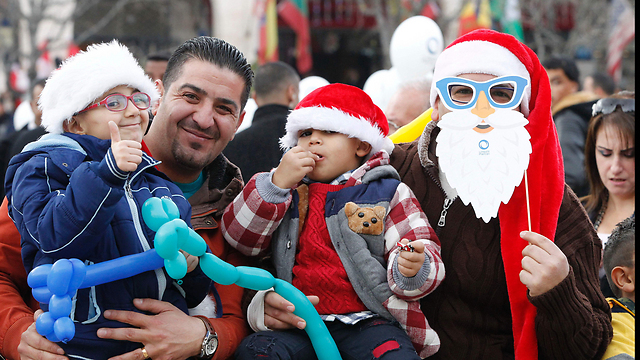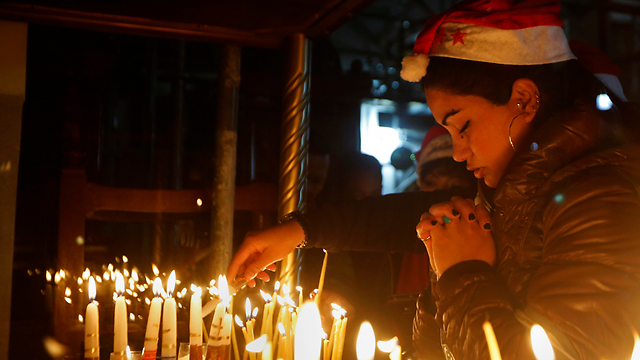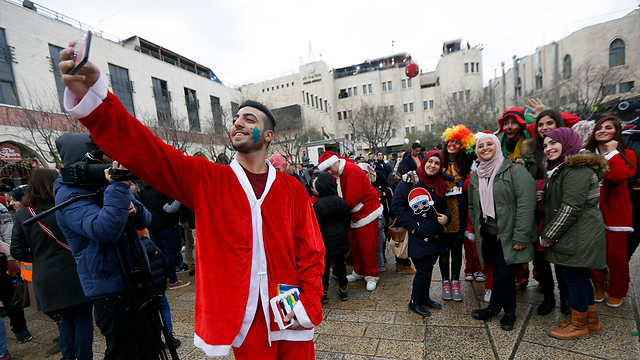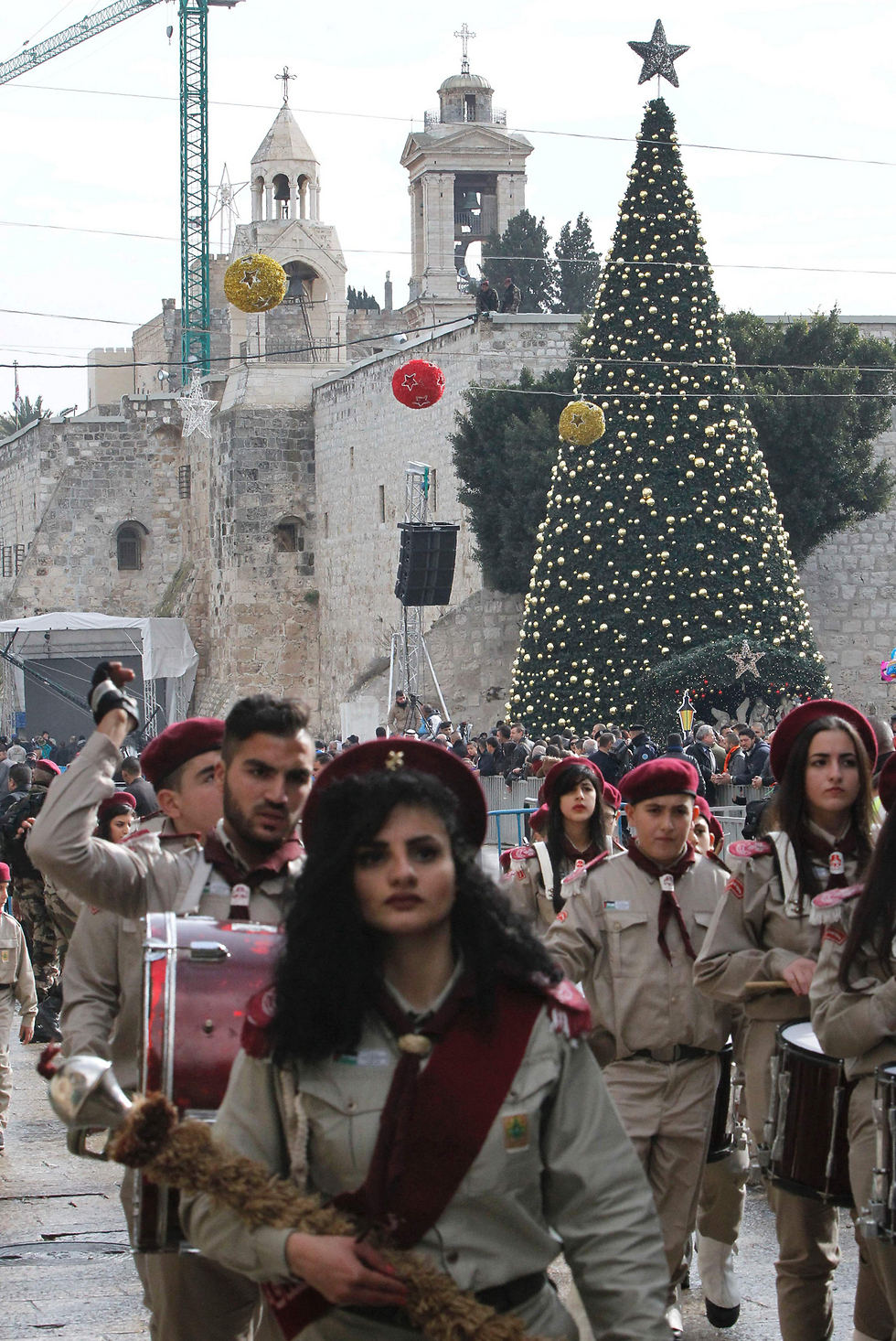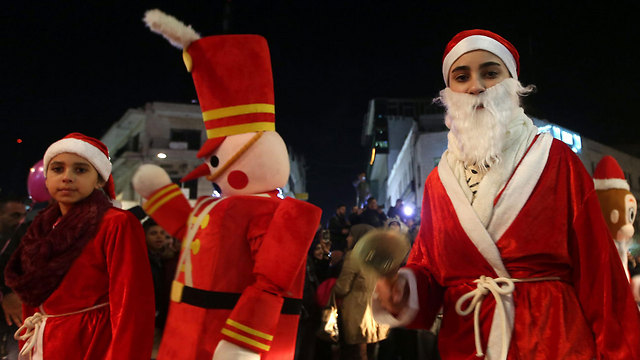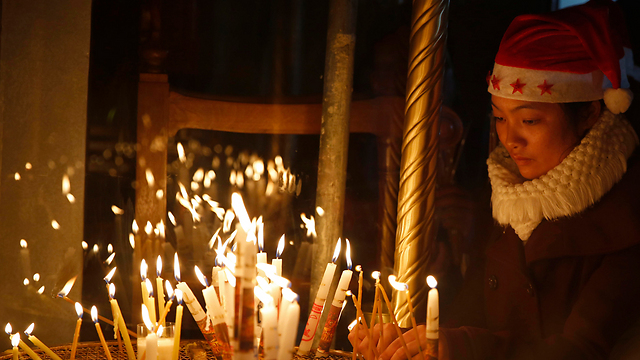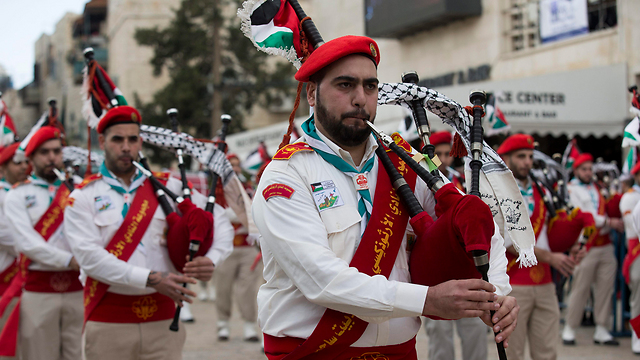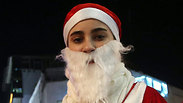

Thousands of faithful celebrate Christmas in Bethlehem
Christians celebrate Christmas Eve in Jesus' birthplace with a massive decorated tree, holiday songs in Arabic, parades and of course, the midnight mass at the Church of the Nativity; thousands expect to arrive in the Holy Land for the holiday, with Bethlehem hotels fully booked.
Thousands of pilgrims and tourists from around the world together with locals began Christmas Eve celebrations in Jesus' traditional birthplace of Bethlehem on Saturday, lifting spirits after a tense year between Palestinians and Israelis.
The faithful braved the chilly weather outside Manger Square in the biblical West Bank town of Bethlehem as traditional Christmas songs like "Jingle Bells" played in Arabic over loudspeakers and scout groups paraded with bagpipes and sang carols.
Elated tourists and local Christians alike wandered around the square illuminated by festive red and golden lights and a large Christmas tree, visiting souvenir shops and restaurants.
"It's very unique, I've never seen anything like it," said Rodrigo Reis, 23, who came from Louisville, Kentucky. "It's very meaningful, it's Christmas time, where everything started."
Christian clergymen welcomed the top Roman Catholic cleric in the Holy Land inside the Church of Nativity in Bethlehem, the birth place of Jesus Christ, as Christians worldwide begin to prepare to celebrate Christmas this year.
The Rev. Pierbattista Pizzaballa, the apostolic administrator of the Latin Patriarchate, is the temporary chief clergyman to the local Catholic population. He traveled from Jerusalem to Bethlehem on Saturday in a traditional procession.
Christmas celebrations will culminate with midnight mass at the Church of the Nativity—with the grotto where Jesus is believed to have been born underneath.
Some 2,500 tickets are usually given out for the mass and those wishing to attend must register in advance.
Christmas tourism
Beyond that, tens of thousands of tourists are expected to visit sites including Bethlehem, Jerusalem and Nazareth over the holidays, tourism officials say.
Israel's Tourism Ministry said some 120,000 visitors were expected in December, half of them Christians.
Christians make up less than two percent of the populations of both Israel and the Palestinian territories, though they account for some 28 percent of Bethlehem's 32,000 people.
Palestinian officials said they were expecting more visitors than last year, with all the hotels in Bethlehem fully booked.
"There is more stability this year and the numbers coming out of the tourism ministry are showing that there will be growth between 2015 and 2016," said Sami Khoury, who runs the Visit Palestine online tourism portal.
There is more optimism this year in Israel and the West Bank after a wave of violence and protests that erupted in October 2015 sharply reduced visits for Christmas.
For Wahid al-Laham, a Bethlehem shop owner selling Christmas memorabilia and decorations, shopping has been better than last year but still falls short in comparison to previous years.
Christmas shopping "was half the rate of previous years, but 80 percent higher than compared to 2015," he said.
Holiday spirit at the birthplace of Jesus
Every year the city of Bethlehem hosts a series of Christmas celebrations. From parades to lighting a Christmas tree almost as big as the one at Rockefeller Center in New York City, to restoring mosaics at the famous Church of Nativity, the city is looking to promote itself on and to strengthen the Christian community. The city also offers a Christmas market and a number of plays and exhibitions showcasing the holiday spirit.
Palestinian officials say Christmas celebrations are a chance to show the world that the Palestinians can govern themselves and to encourage them to support a two-state solution for an independent Palestinian state alongside Israel.
“Of course it is in our interest to have a two-state solution,” Issa Kassissieh, the Palestinian Ambassador to the Holy See, told The Media Line. “Here in Palestine, we are working to consolidate and to strengthen the roots of Christianity in Palestine.”
According to Kassissieh, promoting and strengthening the religion, however, is one of the top priorities of the Palestinian Authority, he said.
Given the current political instability in the Middle East with the ongoing civil war in Syria and the armed conflict between ISIS and Iraqi forces to retake Mosul, the region is losing many of its churches and connections to Christianity. Bethlehem, therefore, is promoting itself as a defender of peace and stability.
“Politics here are so multilayered,” Ian Knowles, a Christian icon painter and the director of the Icon school in Bethlehem, told The Media Line. “And, Palestine, especially Bethlehem, is right on the fault line between many of these different forces.”
“Bethlehem is the place where, for Christians, matter suddenly matters,” Knowles said. “God becomes a little baby, he becomes part of the material world, and so what you can see becomes graced and full of something deeply spiritual.”
Aside from promoting Christianity through religiously motivated artistic endeavors, the city has also generated both financial and political support from the international community in restoring and renovating the Church of Nativity in the Old City of Bethlehem.
Built in the fourth century, in the year 332, the church, which Christians believe is the actual birthplace of Jesus Christ, was falling apart, especially with bad leaks in the roof.
In 2009, after lengthy negotiations with the Greek Orthodox Church, the Franciscan Church and the Armenian Orthodox Church, Palestinian Authority President Mahmoud Abbas issued a presidential decree calling for renovations to the Church of Nativity.
The Palestinian government raised money to cover some of the expenses of the renovations; however, the work could not have been accomplished without financial support from many European and other Middle Eastern churches and countries. Spain, France, Hungary, Russia, Italy, Greece and even Morocco and Kuwait all contributed to the restoration. The total cost of restoring the church is just under $20 million and is expected to be completed in 2019.
“We are supporting the Christian presence here in Palestine and in the holy land not only by preserving the Palestinian Christians but also by preserving and renovating their churches,” Minister Ziad Al-Bandak, the adviser to Abbas, told The Media Line.
Katie Beiter, a student journalist with The Media Line, contributed to this report.














